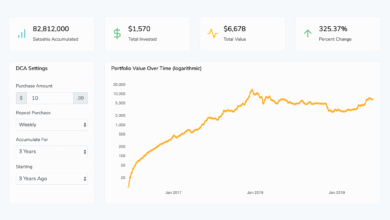USDW Stablecoin: Wisdomtree’s New Frontier in Finance

In a significant move within the world of digital assets investments, Wisdomtree has officially launched the USDW stablecoin. Designed to provide reliability and efficiency, USDW offers a U.S. dollar-backed solution for both retail and institutional users looking to engage in seamless transactions. As part of a broader vision for a robust stablecoin business model, USDW is supported by WTGXX, a tokenized money market fund that helps investors earn yield on their assets. Furthermore, the stablecoin interoperability feature allows users to easily transition between USDW and widely recognized alternatives like USDC, enhancing accessibility for all types of investors. With an integrated approach, Wisdomtree aims to redefine how stablecoins are utilized across a variety of financial applications, streamlining investments and treasury operations.
In the rapidly evolving landscape of cryptocurrency, Wisdomtree has made headlines with its latest offering: a new U.S. dollar-backed digital currency known as USDW. This innovative asset seeks to bridge the gap between traditional finance and the burgeoning realm of tokenized investments. By combining features such as a tokenized money market fund and the ability to interact with other stablecoins like USDC, this digital currency promotes greater liquidity and investment possibilities. Wisdomtree’s focus on creating a comprehensive platform for both individual and institutional investors illustrates the potential of stablecoins to reshape financial transactions. As the market for tokenized assets expands, USDW represents a significant step towards establishing a more inclusive and efficient financial ecosystem.
Introduction to USDW Stablecoin
Wisdomtree has officially entered the stablecoin market with the launch of its USDW stablecoin. This strategic move is part of a broader initiative to create a comprehensive ecosystem that caters to both retail and institutional users. USDW is designed to be a U.S. dollar-backed stablecoin, ensuring stability and reliability for transactions. By leveraging its expertise in asset management and investment products, Wisdomtree aims to enhance the usability and adoption of its stablecoin in various financial applications.
The introduction of USDW represents a pivotal moment for Wisdomtree as it seeks to establish itself as a major player in the evolving landscape of digital assets. The stablecoin not only supports everyday transactions, but it also integrates with a tokenized money market fund, WTGXX, which is designed to provide yield. This dual offering positions USDW as a versatile option for investors looking to manage their assets efficiently while earning potential returns.
Integration of USDW and WTGXX
The combination of USDW and WTGXX stands out as a significant innovation in the stablecoin business model. While USDW facilitates transactions with ease and stability, WTGXX offers an opportunity for investors to earn returns on their digital assets. This unique pairing enhances the overall value proposition of Wisdomtree’s offerings, attracting a broader audience ranging from casual investors to institutional players looking for robust investment strategies in digital currencies.
Moreover, the integration of these products allows for seamless transitions between stablecoin transactions and yield-generating investment options. By utilizing USDW and WTGXX, users can manage their portfolios effectively, balancing liquidity with investment growth. This synergy not only demonstrates Wisdomtree’s commitment to innovating within the digital assets space but also highlights its strategic vision for the future of finance.
Importance of Interoperability in Stablecoins
A key feature of Wisdomtree’s USDW is its interoperability with other stablecoins, notably USDC. By developing a stablecoin interoperability layer, Wisdomtree ensures that clients can easily move between various digital assets and traditional currencies. This capability significantly lowers the barrier for entry into the cryptocurrency market, making it accessible for both newcomers and experienced investors alike.
Interoperability is crucial in the stablecoin ecosystem, as it facilitates greater flexibility and utility for users. The ability to transact seamlessly with major stablecoins enhances USDW’s appeal, particularly for those engaged in digital asset investments. This approach not only aligns with the growing trend of diverse asset management within the crypto space but also positions Wisdomtree as an innovative leader committed to enhancing the stability and function of its products in real-world applications.
USDW’s Role in Digital Asset Investments
As digital assets continue to gain traction in mainstream finance, the role of stablecoins like USDW becomes increasingly significant. Wisdomtree aims to leverage its expertise in finance to help users navigate the complexities of digital asset investments. With USDW, investors can participate in a stable and secure environment, providing them with the necessary confidence to explore various investment opportunities within the digital landscape.
Additionally, as an asset management firm, Wisdomtree’s solid foundation and reputation lend credibility to the utilization of USDW in investment portfolios. The stablecoin can act as a reliable medium for transactions, allowing investors to diversify their holdings without the volatility typically associated with cryptocurrencies. This strategic positioning not only benefits individual investors but also supports institutional strategies that seek stability in the fluctuating crypto market.
Wisdomtree’s Vision for a Comprehensive Stablecoin Ecosystem
Wisdomtree’s vision for a comprehensive stablecoin ecosystem encompasses both retail and institutional users, reflecting a commitment to inclusivity and innovation. By launching USDW, the firm aims to create a stable environment conducive to digital transactions while simultaneously offering investment opportunities through WTGXX. This dual approach aligns with broader market trends that emphasize stability and growth in the ever-evolving world of digital currencies.
The establishment of a stablecoin business model that prioritizes user experience and effective asset management is essential for attracting diverse stakeholders. Wisdomtree’s focus on enhancing both usability and accessibility ensures that USDW not only supports simple transactions but also integrates seamlessly with more complex financial strategies. This holistic view equips investors with the tools they need to thrive in a rapidly changing market.
Understanding the Tokenized Money Market Fund
Wisdomtree’s WTGXX, a tokenized U.S. government money market fund, is designed to complement the USDW stablecoin. As investors navigate through the digital assets landscape, the availability of a tokenized money market fund provides a vehicle for generating yields while maintaining liquidity. This innovative financial product underscores Wisdomtree’s commitment to harnessing technology in creating investment opportunities that blend traditional finance with digital assets.
The tokenization of the money market fund allows for increased accessibility and broader participation. Investors can partake in this money market fund without the traditional barriers associated with such investments. This approach not only democratizes access to government-backed securities but also aligns with the overall ethos of making finance more accessible in the digital age, appealing to a more diverse investor base.
The Future of Stablecoins and Digital Assets
The future of stablecoins like USDW within the digital assets ecosystem appears promising as more individuals and institutions recognize their potential advantages. With features like price stability and transaction efficiency, stablecoins are becoming essential tools for conducting business in the crypto space. Wisdomtree’s entry with USDW consolidates its position in this growing market, offering promising developments for users looking for an efficient means to manage their assets.
Looking ahead, it is essential for stablecoin providers to focus on building trust and transparency among users. As the regulatory landscape continues to evolve, stablecoins must adapt to ensure compliance while delivering value. Wisdomtree’s proactive approach to user engagement and regulatory discussions will be pivotal in shaping the future of its USDW stablecoin and the broader digital asset investment landscape.
Advantages of Using USDW in Everyday Transactions
One of the primary advantages of using USDW in everyday transactions is its inherent stability as a U.S. dollar-backed stablecoin. This stability allows users to transact with certainty, reducing the risk often associated with traditional cryptocurrencies. For both retail and institutional investors, this feature makes USDW an attractive option for various applications, ranging from purchasing goods and services to making larger financial transactions.
In addition, USDW’s integration within Wisdomtree Prime, the retail app, enhances its usability. Through this platform, users can easily move value and participate in investment opportunities without needing extensive knowledge of digital assets. This user-friendly approach demystifies the crypto experience, making it easier for the average consumer to engage with emerging financial technologies with confidence.
Conclusion: Wisdomtree’s Impact on the Stablecoin Market
Wisdomtree’s launch of USDW represents a significant impact on the stablecoin market. By strategically positioning itself with a U.S. dollar-backed stablecoin and a tokenized money market fund, the firm is set to reshape the landscape for both retail and institutional investors. This innovative approach showcases Wisdomtree’s dedication to enhancing the digital asset investment experience.
As the financial world becomes increasingly digital, Wisdomtree’s commitment to developing robust and reliable products like USDW will play a vital role in providing a secure and efficient avenue for transactions. The synergies created by USDW, WTGXX, and their interoperability will continue to drive forward the adoption of stablecoins and solidify Wisdomtree’s reputation as a leader in the digital asset space.
Frequently Asked Questions
What is the USDW stablecoin and how does it relate to digital assets investments?
USDW is Wisdomtree’s U.S. dollar-backed stablecoin designed to facilitate transactions within digital assets investments. It provides a stable value peg, making it suitable for exchanges and strategic investments in the growing digital finance ecosystem.
How does USDW enable USDC interoperability?
USDW features a stablecoin interoperability layer that allows users to easily convert between USDW and USDC. This interoperability enhances user flexibility and accessibility, making USDW a viable option for various digital assets transactions.
What is the role of the WTGXX tokenized money market fund in conjunction with USDW?
The WTGXX tokenized money market fund is strategically paired with USDW to offer investors yield on their holdings. This integration allows users to effectively manage their investments while benefiting from the stability offered by the USDW stablecoin.
How does Wisdomtree plan to establish its stablecoin business model with USDW?
Wisdomtree aims to build a comprehensive stablecoin business model around USDW by serving both retail and institutional users, leveraging advanced technology for seamless transactions, and integrating USDW into their broader suite of investment solutions.
Can I receive dividends in USDW using Wisdomtree Prime?
Yes, users of Wisdomtree Prime, the company’s retail app, have the option to receive dividends in USDW, enhancing liquidity and usability for investors participating in the stablecoin ecosystem.
Where is Wisdomtree headquartered and what is the focus of its business?
Wisdomtree is headquartered in New York City and specializes in asset management, including exchange-traded funds (ETFs) and digital assets, with a growing emphasis on innovative investment products like the USDW stablecoin.
What benefits does USDW offer for treasury operations?
USDW facilitates treasury operations by providing a stable and secure medium for transactions, enhancing efficiency in fund management, and allowing businesses to utilize digital assets effectively for operational needs.
How can USDW impact the future of stablecoins in the digital economy?
USDW could significantly impact the future of stablecoins by introducing a robust framework for digital transactions and investments, alongside the ability to integrate seamlessly with existing stablecoins like USDC, fostering greater acceptance and use in the digital economy.
| Key Feature | Details |
|---|---|
| Launch of USDW | Wisdomtree has launched its stablecoin, USDW, to establish a comprehensive stablecoin business. |
| Purpose of USDW | USDW is a U.S. dollar-backed stablecoin designed for transactions. |
| Interoperability Layer | USDW features a stablecoin interoperability layer for easy transactions with popular stablecoins like USDC. |
| Related Product: WTGXX | Complementing USDW, WTGXX is a tokenized U.S. government money market fund offering yield. |
| Investment Applications | USDW and WTGXX enable investments, reserves, and treasury operations in real-world applications. |
| Integration with Wisdomtree Prime | USDW operates within the Wisdomtree Prime app, facilitating value movement and dividend distribution. |
| Company Background | Wisdomtree is an asset management firm based in NYC, specializing in ETFs and increasing focus on digital assets. |
Summary
The USDW stablecoin represents a significant advancement in Wisdomtree’s efforts to establish a robust stablecoin ecosystem for both retail and institutional users. By integrating USDW with tools like WTGXX and the Wisdomtree Prime app, the firm is positioning itself at the forefront of digital asset innovation, facilitating smoother transactions and investment opportunities.




